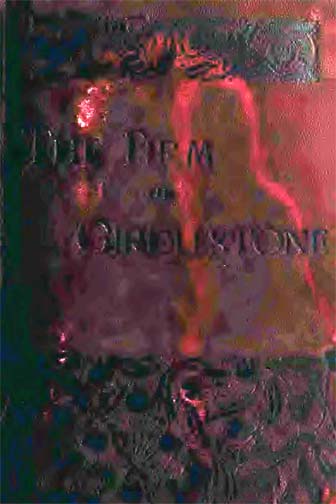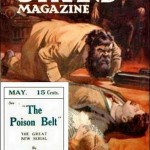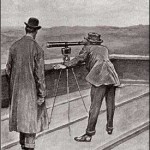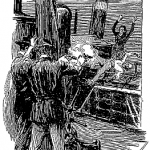
Tom Dimsdale’s duties were far from light. Not only was he expected to supervise the clerks’ accounts and to treat with the wholesale dealers, but he was also supposed to spend a great part of his time in the docks, overlooking the loading of the outgoing ships and checking the cargo of the incoming ones. This latter portion of his work was welcome as taking him some hours a day from the close counting-house, and allowing him to get a sniff of the sea air—if, indeed, a sniff is to be had on the inland side of Woolwich. There was a pleasing life and bustle, too, in the broad, brown river, with its never-ending panorama of vessels of every size and shape which ebb and flow in the great artery of national life.
So interesting was this liquid highway to Tom’s practical mind, that he would often stand at the head of the wharf when his work was done and smoke a meditative pipe. It was a quiet spot, which had once been busy enough, but was now superseded by new quays and more convenient landing-places. All over it were scattered great rusty anchors, colossal iron chains, deserted melancholy boilers, and other debris which are found in such places, and which might seem to the fanciful to be the shells and skeletons of strange monsters washed up there by the tide. To whom do these things belong? Who has an interest in them? Of what use are they? It appeared to Tom sometimes as if the original owners and their heirs must have all died away, and left these grim relics behind them to any one who might have the charity to remove them.
From this coign of vantage a long reach of the river was visible, and Tom sitting there would watch the fleets of passing vessels, and let his imagination wander away to the broad oceans which they had traversed, and the fair lands under bluer skies and warmer suns from which they had sailed. Here is a tiny steam-tug panting and toiling in front of a majestic three-master with her great black hulk towering out of the water and her masts shooting up until the topmast rigging looks like the delicate web of some Titanic spider. She is from Canton, with tea, and coffee, and spices, and all good things from the land of small feet and almond eyes. Here, too, is a Messagerie boat, the French ensign drooping daintily over her stern, and her steam whistle screeching a warning to some obstinate lighters, crawling with their burden of coal to a grimy collier whose steam-winch is whizzing away like a corncrake of the deep. That floating palace is an Orient boat from Australia. See how, as the darkness falls, a long row of yellow eyes glimmer out from her sides as the light streams through her countless portholes. And there is the Rotterdam packet-boat coming slowly up, very glad to get back into safe waters again, for she has had a wildish time in the North Sea. A coasting brig has evidently had a wilder time still, for her main-topmast is cracked across, and her rigging is full of the little human mites who crawl about, and reef, and splice, and mend.
An old acquaintance of ours was out in that same gale, and is even now making his way into the shelter of the Albert docks. This was none other than the redoubtable Captain Hamilton Miggs, whose ship will persistently keep afloat, to the astonishment of the gallant captain himself, and of every one else who knows anything of her sea-going qualities. Again and again she had been on the point of foundering; and again and again some change in the weather or the steady pumping of the crew had prevented her from fulfilling her destiny. So surprised was the skipper at these repeated interpositions of Providence that he had quite made up his superstitious mind that the ship never would go down, and now devoted himself with a whole heart to his old occupation of drinking himself into delirium tremens and physicking himself out of it again.
The Black Eagle had a fair cargo aboard, and Miggs was proportionately jubilant. The drunken old sea-dog had taken a fancy to Tom’s frank face and honest eyes, and greeted him with effusion when he came aboard next morning.
“Knock me asunder, but you look rosy, man!” he cried. “It’s easy to see that you have not been lying off Fernando Po, or getting the land mist into your lungs in the Gaboon.”
“You look well yourself, captain,” said Tom.
“Tolerable, tolerable. Just a touch of the jumps at times.”
“We can begin getting our cargo out, I suppose? I have a list here to check it. Will you have the hatches off at once?”
“No work for me,” said Captain Hamilton Miggs with decision. “Here, Sandy—Sandy McPherson, start the cargo, will ye, and stir your great Scotch bones. I’ve done enough in bringing this sieve of a ship all the way from Africa, without working when I am in dock.”
McPherson was the first mate, a tall, yellow-bearded Aberdonian. “I’ll see t’it,” he said shortly. “You can gang ashore or where you wull.”
“The Cock and Cowslip,” said the captain, “I say, you—Master Dimsdale—when you’re done come up an’ have a glass o’ wine with me. I’m only a plain sailor man, but I’m damned if my heart ain’t in the right place. You too, McPherson—you’ll come up and show Mr. Dimsdale the way. Cock and Cowslip, corner o’ Sextant Court.” The two having accepted his invitation, the captain shuffled off across the gangway and on to terra firma.
All day Tom stood at the hatchway of the Black Eagle, checking the cargo as it was hoisted out of her, while McPherson and his motley assistants, dock labourers, seamen, and black Kroomen from the coast, worked and toiled in the depths below. The engine rattled and snorted, and the great chain clanked as it was lowered into the hold.
“Make fast there!” cries the mate.
“Aye, aye, sir!”
“All right?”
“All right, sir.”
“Hoist away!”




